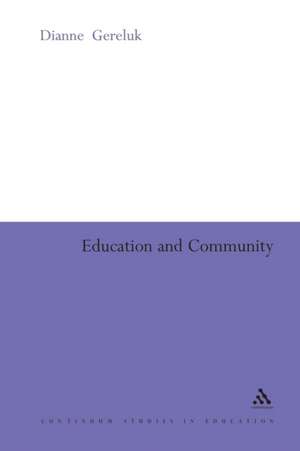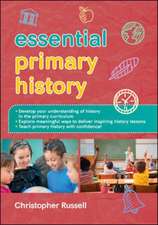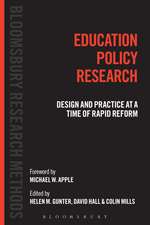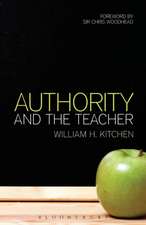Education and Community
Autor Dr Dianne Gereluken Limba Engleză Paperback – 19 mar 2008
Notions of community are found in almost every educational context from primary schools to HE institutions. Given the polemic nature of promoting community in schools and society today, this fascinating book uses an interdisciplinary approach of political philosophy and sociology to develop theoretical principles for the promotion of communities, and subsequently applies them to the realities of schools and society. This book is fully international, drawing on examples and references from the UK, US and Canada.
| Toate formatele și edițiile | Preț | Express |
|---|---|---|
| Paperback (1) | 343.99 lei 6-8 săpt. | |
| Bloomsbury Publishing – 19 mar 2008 | 343.99 lei 6-8 săpt. | |
| Hardback (1) | 772.74 lei 6-8 săpt. | |
| Bloomsbury Publishing – 22 feb 2006 | 772.74 lei 6-8 săpt. |
Preț: 343.99 lei
Preț vechi: 423.45 lei
-19% Nou
Puncte Express: 516
Preț estimativ în valută:
65.82€ • 68.72$ • 54.48£
65.82€ • 68.72$ • 54.48£
Carte tipărită la comandă
Livrare economică 04-18 aprilie
Preluare comenzi: 021 569.72.76
Specificații
ISBN-13: 9781847060396
ISBN-10: 1847060390
Pagini: 224
Dimensiuni: 156 x 234 x 17 mm
Greutate: 0.36 kg
Editura: Bloomsbury Publishing
Colecția Continuum
Locul publicării:London, United Kingdom
ISBN-10: 1847060390
Pagini: 224
Dimensiuni: 156 x 234 x 17 mm
Greutate: 0.36 kg
Editura: Bloomsbury Publishing
Colecția Continuum
Locul publicării:London, United Kingdom
Descriere
Notions of 'community' are found in many educational contexts from primary schools to HE institutions. Given the polemic nature of promoting community in schools and society, this book offers a fully international approach to using political philosophy and sociology to develop the promotion of communities, schools and society.
Caracteristici
The fully international approach is backed with extensive research at international conferences on issues such as Canadian charter schools, liberal theory and education, and communities and schooling.
Cuprins
Introduction
Chapter 1: The promise and paradox of community
Part 1: Community and education
Chapter 2: Community directives for schooling
Chapter 3: Tensions inherent in community
Chapter 4: Valuing community
Chapter 2: Community directives for schooling
Chapter 3: Tensions inherent in community
Chapter 4: Valuing community
Part 2: A liberal conception of community
Chapter 5: A liberal conception of community
Chapter 6: Permissible communities in liberal education
Chapter 7: Liberal communities in school
Chapter 5: A liberal conception of community
Chapter 6: Permissible communities in liberal education
Chapter 7: Liberal communities in school
Part 3: Community, Schools and Society
Chapter 8: Communities and society
Chapter 9: Communities in a changing education environment
Chapter 10: Envisaging liberal communities
Chapter 8: Communities and society
Chapter 9: Communities in a changing education environment
Chapter 10: Envisaging liberal communities
Recenzii
"I found this book interesting" The Authors Journal Compilation 2009
"With the contemporary concern about community cohesion and the role of education in such cohesion, the publication of Gereluk's book in paperback is timely...this book might force some thinking." Educational Review, December 2009
'Community is widely thought to be an important educational aim. Education is done through community and to benefit community. But there has been little systematic thinking in education about the relation between education and community. Gereluk (Rodehampton Univ., UK) wants to remedy that by noting the characteristics of community, formulating a philosophical conception of community, and considering contemporary social and school effects on community. She draws primarily on John Rawls's liberal democratic theory for her principles: "communities fall within the constraints of justice," with liberty and equality being the foremost principles. She then considers which community practices should be permissible in liberal education by tackling a number of controversial subjects. These include a Muslim faith community's demands for exemptions from the core curriculum, dress codes and school uniform policies (head scarves), and single-sex schools; and Alan Peshkin's study, in his book God's Choice (1986), of Bethany Baptist Academy, a fundamentalist Christian school that seeks to avoid the influence of secular community. Gereluk makes careful distinctions and is considerate of each community's beliefs. Her chapters "A Liberal Conception of Community" and "Permissible Communities in Liberal Education" are must reading, particularly for school leaders and those involved in politics and education. Summing Up: Highly recommended. Upper-division undergraduates through practitioners. - R. R. Sherman, emeritus, University Florida
"With the contemporary concern about community cohesion and the role of education in such cohesion, the publication of Gereluk's book in paperback is timely...this book might force some thinking." Educational Review, December 2009
'Community is widely thought to be an important educational aim. Education is done through community and to benefit community. But there has been little systematic thinking in education about the relation between education and community. Gereluk (Rodehampton Univ., UK) wants to remedy that by noting the characteristics of community, formulating a philosophical conception of community, and considering contemporary social and school effects on community. She draws primarily on John Rawls's liberal democratic theory for her principles: "communities fall within the constraints of justice," with liberty and equality being the foremost principles. She then considers which community practices should be permissible in liberal education by tackling a number of controversial subjects. These include a Muslim faith community's demands for exemptions from the core curriculum, dress codes and school uniform policies (head scarves), and single-sex schools; and Alan Peshkin's study, in his book God's Choice (1986), of Bethany Baptist Academy, a fundamentalist Christian school that seeks to avoid the influence of secular community. Gereluk makes careful distinctions and is considerate of each community's beliefs. Her chapters "A Liberal Conception of Community" and "Permissible Communities in Liberal Education" are must reading, particularly for school leaders and those involved in politics and education. Summing Up: Highly recommended. Upper-division undergraduates through practitioners. - R. R. Sherman, emeritus, University Florida













